Related Research Articles

Manfred Mann were an English rock band, formed in London and active between 1962 and 1969. The group were named after their keyboardist Manfred Mann, who later led the successful 1970s group Manfred Mann's Earth Band. The band had two different lead vocalists, Paul Jones from 1962 to 1966 and Mike d'Abo from 1966 to 1969.

Klaus Otto Wilhelm Voormann is a German artist, musician, and record producer.

Paper Lace are a British pop/rock band, formed in Nottingham, who rose to success in 1974 and during that year had three UK Top 40 hit singles. In the United States they are considered a one-hit wonder, having had a single US Number One hit.
Geoffrey Stephens was an English songwriter and record producer, most prolific in the United Kingdom in the 1960s and 1970s. He wrote a long series of hit records, often in conjunction with other British songwriters including Tony Macaulay, John Carter, Roger Greenaway, Peter Callander, Barry Mason, Ken Howard, Alan Blaikley, Don Black, Mitch Murray, and Les Reed.

Mitch Murray is an English songwriter, record producer and author. He has won two Ivor Novello Awards, including the Jimmy Kennedy Award. Murray has written, or co-written, songs that have produced five UK and three US chart-topping records. He has also been awarded the Gold Badge of Merit by the British Academy of Songwriters, Composers and Authors.

Thomas John Patrick McGuinness is a guitarist, songwriter, author, record and TV producer, who played bass and later guitar with popular 60s rock band, Manfred Mann.

The Manfreds is a British pop group, formed in 1991 as a reunion of former members of the 1960s pop group Manfred Mann, however without their eponymous founder Manfred Mann.
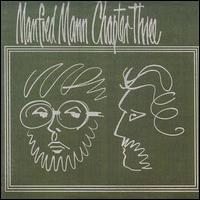
Manfred Mann Chapter Three is the debut album released in 1969 by Manfred Mann Chapter Three. It was one of the three first albums released on the Vertigo record label. The principal members of the group were Manfred Mann and Mike Hugg. Mann played the organ and acted as the group's musical arranger, whilst Hugg handled vocals, played piano and was the chief songwriter. The group was augmented by a five-piece brass section and several distinguished jazz soloists.

Mighty Garvey! is the fifth and final studio album by Manfred Mann, released on 28 June 1968 by Fontana Records. It was the last recorded by the band after the change of direction and personnel of their 1966 album As Is. It continued a transition away from jazz and blues towards self-composed art-pop. Despite including two UK top 5 hit singles, the album did not chart and the band split up the year after. In the US and Canada, it was released as The Mighty Quinn by Mercury Records.
Peter Robin Callander was an English songwriter and record producer. Active from the 1960s onwards, Callander wrote or co-wrote songs that have been performed by recording artists such as Cilla Black, Tom Jones, Cliff Richard, Shirley Bassey, and The Tremeloes, amongst many others. On some songs he was credited as Robin Conrad. Callander was also a founder member of the Society of Distinguished Songwriters (SODS), a director of PRS for Music, and formed a publishing company, Callander Family Music Ltd.
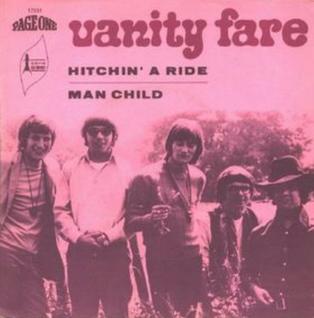
"Hitchin' a Ride" is a song written by Mitch Murray and Peter Callander issued as a single by the English pop/rock band Vanity Fare in late 1969. It reached number 16 on the UK Singles Chart in February 1970 but was a bigger hit in the United States, reaching number 5 on the Hot 100 on June 27, 1970. Billboard ranked the record as the number 14 song of 1970. In Chicago, the record achieved even greater heights, topping the WCFL Big 10 Countdown on 18–25 May 1970, ranking #4 for all of 1970 and ranking #12 on rival WLS Radio 89 Hit Parade on 6 July 1970, ranking #10 for all of 1970. "Hitchin' a Ride" sold a million copies in the United States alone, and it became a gold record.

A Sideman's Journey is the first solo album by German musician and artist Klaus Voormann, released in July 2009. Voormann is best known as the creator of the cover art for The Beatles' album Revolver as well as for being a much-in-demand session musician during the 1970s. He played bass on a large number of well-known albums by ex-Beatles John Lennon, George Harrison and Ringo Starr − including All Things Must Pass, Imagine and The Concert for Bangladesh − and by artists such as Harry Nilsson, Doris Troy, Lou Reed, Gary Wright, Carly Simon and Randy Newman. Before then, Voormann had been a member of the 1960s pop group Manfred Mann. A Sideman's Journey is notable for including performances by Paul McCartney, Ringo Starr and Yusuf Islam, among others.
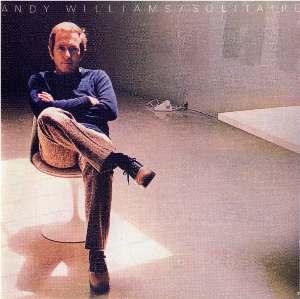
Solitaire is the thirty-first studio album by American pop singer Andy Williams, released in the fall of 1973 by Columbia Records and was an attempt to move away from his formulaic series of recent releases that relied heavily on songs that other artists had made popular.

As Is is the third British studio album by Manfred Mann, released in the United Kingdom on 21 October 1966 through Fontana Records. It was their fourth overall but their first to feature new members Mike d'Abo and Klaus Voormann.

Instrumental Assassination is a 1966 jazz-rock EP by Manfred Mann, produced by Shel Talmy and released by Fontana Records (TE17483). Mann reported that the group "loved it" and the producer was "particularly pleased": Fontana's Jack Baverstock found it full of ideas, humour and new thinking, but the EP sold poorly and was re-released in its entirety on the 1968 Fontana compilation album What A Mann.

"Ha! Ha! Said the Clown" is a song written by Tony Hazzard, first recorded by British pop group Manfred Mann. Hazzard claims the song "came out of the blue" though he did not demo it for weeks. Following recording a demo, he approached manager Gerry Bron, who liked it enough to want one of his groups, Manfred Mann, to record it. Manfred Mann recorded their version of the single on 10 February 1967 at Philips Studio in Marble Arch, London, together with producer Shel Talmy. It was the second of three singles Manfred Mann recorded to feature the Mellotron.

Footprint is the second solo album by American musician Gary Wright, released in 1971 on A&M Records. It contains "Stand for Our Rights", an anthem-like song calling for social unity that was issued as a single in advance of the album. Wright recorded the majority of Footprint in London with a large cast of musicians – including George Harrison, Hugh McCracken, Alan White, Klaus Voormann, Jim Gordon, Jim Keltner and Bobby Keys – many of whom, like Wright, had played on Harrison's All Things Must Pass triple album in 1970. Harrison's contributions included an uncredited role as producer, and serve as an example of his support for Wright during the early stages of Harrison's solo career. The ballad "Love to Survive" is one of three tracks that feature an orchestral arrangement by John Barham.
"My Name Is Jack" is a song written by American record producer John Simon and released as a single by British group Manfred Mann in 1968. Their version reached number 8 on the UK Singles Chart. It became an international Top 10 hit, but only reached number 104 in the US.
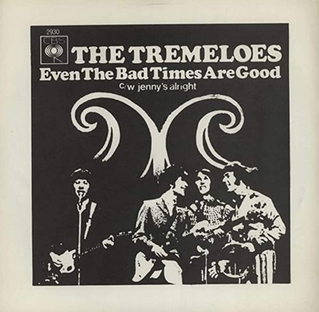
"Even the Bad Times Are Good" is a song written by British group the Tremeloes, released as a single in July 1967. It became their third consecutive top-ten hit in the UK and continued their international success.
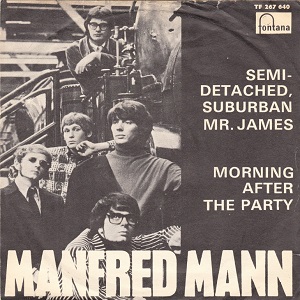
"Semi-Detached, Suburban Mr. James" is a song written by songwriters Geoff Stephens and John Carter, recorded by English pop group Manfred Mann in 1966. Previous to this, it was recorded by the band Herbie's People who were signed to CBS and had recorded other John Carter songs. The original title was ....Mr Jones and was recorded that way by Herbie's People. Their version was pulled by CBS when Manfred Mann said they'd record it. It was subsequently issued but only in the USA on the Okeh label. Stephens and Carter, who were writers for a publishing company on Denmark Street, London, wrote the song in a style different from their usual compositions, as love was not the prevalent theme. Introduced to the song by producer Shel Talmy, Manfred Mann recorded it at Philips Studio in August 1966. Released by Fontana Records on 21 October 1966, the song was backed by drummer Mike Hugg's composition "Morning After The Party" as the group's second single on the label. Keyboardist Manfred Mann plays the Mellotron on the recording; it was one of the earliest recordings featuring the instrument. Following a trend set by Bob Dylan, the song tackles the subject of life in British middle class suburbia from the perspective of a narrator, who laments the loss of a lover after her marriage to another man.
References
- 1 2 3 4 "Song: Ragamuffin Man written by Mitch Murray, Peter Callander | SecondHandSongs". secondhandsongs.com. Retrieved 2024-05-13.
- ↑ "MANFRED MANN". Official Charts. 1964-01-29. Retrieved 2024-05-13.
- ↑ "The Irish Charts - All there is to know". irishcharts.ie. Retrieved 2024-05-13.
- ↑ Kent, David (2005). Australian Chart Book 1940–1969. Australian Chart Book Pty Ltd, Turramurra, N.S.W. ISBN 0-646-44439-5.
- ↑ "Suche - Offizielle Deutsche Charts". www.offiziellecharts.de. Retrieved 2024-05-13.
- ↑ Manfred Mann - Ragamuffin Man [1969 Promotional Film] . Retrieved 2024-05-13– via www.youtube.com.
- ↑ aycliffevillage (2009-11-22). "Klaus Voorman 8-string bass/guitar". The Blues Show on BishopFM. Retrieved 2024-05-13.